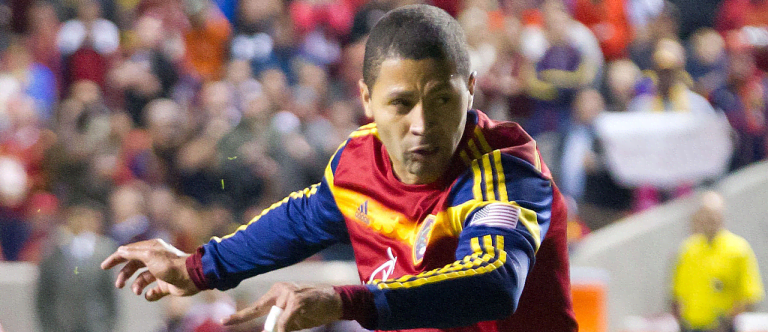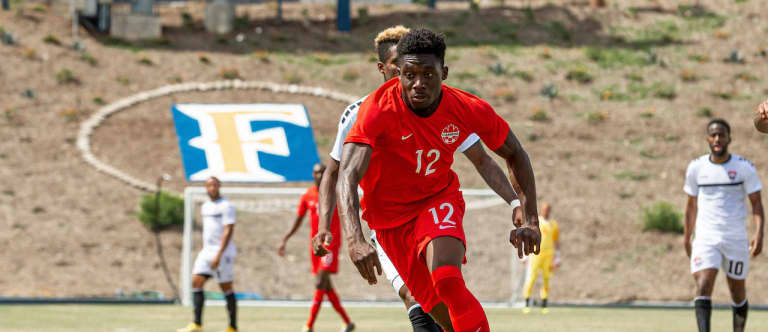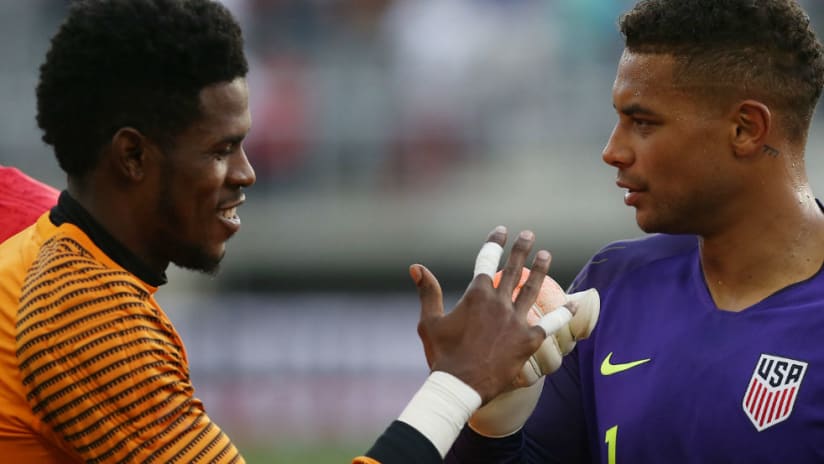As an avowed soccer nerd and card-carrying Concacaf aficionado, I love the Gold Cup.
I understand that not everyone shares that opinion. It can come at an inconvenient time. It can be predictable. It can seem like small potatoes compared to the World Cup. It’s no longer offers a path to the now-defunct FIFA Confederations Cup. It can feel like a been-there-done-that summer slog.
I promise you it only feels that way if you’re wearing a United States or Mexico crest on your chest.
For the rest of the region, the Gold Cup is the big one. Only Canada has broken the US-Mexico duopoly, and that was all the way back in 2000. For Costa Rica, Jamaica, Honduras and Canada, this summer is a chance to make history. For the 10 other nations in the field, up from 12 in past tournaments, it’s a rare opportunity to test themselves against the big boys.
For all of us, it’s a chance to celebrate our region and the incredible variety of soccer cultures packed into North America, Central America and the Caribbean. Here are 10 reasons to nerd out on this summer’s Concacaf party.
The Gold Cup is coming to Costa Rica and Jamaica
The United States is the de facto host of the Gold Cup. It’s been that way since the tournament began in 1991. Only Mexico (1993, 2003) and Canada (2015) have hosted games outside American soil.
That changes in 2019, and it’s about time. The money’s better and organization easier in North America. I get that. Still, Central America and the Caribbean deserve a shot at playing host, too.
On Sunday, Group B kicks off with a doubleheader in San Jose at the national stadium. Group C and Jamaica’s turn comes on Monday, with two games played in Kingston at Independence Park. I hope more countries get the same opportunity in future editions.
Welcome to Concacaf, Leon Bailey
You want drama? Go read up on the relationship between Leon Bailey and the Jamaica Football Federation.
According to the Bayer Leverkusen star, he’s had “personal problems” with the JFF since he was a boy. That’s putting it lightly, and there’s a lot to unpack there. The acrimonious relationship between his adoptive father/agent/manager and the island’s soccer power brokers is particularly complex.
It’s a long story and a family affair for Bailey, but apparently the 21-year-old Bundesliga attacker decided to let bygones be bygones. He’ll get his first cap for the Reggae Boyz in this tournament, presumably against Honduras in the opening match.
Bailey’s got the ability to win the Golden Ball as the Gold Cup’s best player, but smooth sailing from the very start might be asking for too much. Then again, nobody expected back-to-back final appearances, either. We shall see.
Another potential debutante for the Reggae Boyz was a late cut. Ravel Morrison – yes, former Manchester United phenom Ravel Morrison – looked like he was going to make the 23-man roster. Head coach Theodore Whitmore decided against it. Oh, what could have been for soccer nerds from here to Manchester!
Same sentiment for Cory Burke for different reasons. Burke, in case you forgot, is back in Jamaica with visa issues that have prevented him from playing for the Union. He led the team in scoring during Nations League qualifying.
Guess who’s back? Sabo!

Alvaro Saborio playing for Real Salt Lake in 2014 | USA Today Sports Images
Remember when former Real Salt Lake forward Alvaro Saborio suddenly retired just a month into his return to Saprissa? I do. I thought he was still retired. I thought wrong. What a Concacaf and MLS delight it was to find the 37-year-old listed on Costa Rica’s Gold Cup roster.
Turns out Saborio wasn’t actually ready to retire when he said adios to Saprissa. He was just upset about what was going down at the Purple Monster.
Five months after he walked away, he was back banging in goals in the Primera Division for hometown club San Carlos and leading them to their first league title. Saborio has 28 goals in 48 games since coming out of retirement. He’s in such good form — and Costa Rica are so desperate for goals — that Sabo is back playing international soccer for the first time in three years, too.
Concacaf Legends assemble
Which faces are most likely to give you a hint of Concacaf nostalgia this summer?
Here are the nine players on Gold Cup rosters with more than 100 appearances for their respective countries. So many memories, and this might just be our last chance to watch each of them do their thing in this tournament. You never know…
Mexico: Andres Guardado (154), Guillermo Ochoa (101)
Costa Rica: Celso Borges (121), Bryan Ruiz (120), Alvaro Saborio (109)
Honduras:Maynor Figueroa (151), Emilio Izaguirre (102)
United States:Michael Bradley (145), Jozy Altidore (110)
Panama: Roman Torres (110), Armando Cooper (104)
CONFIRMED: Alphonso Davies, still a baby (in age only)

Alphonso Davies in action for Canada in a friendly this week | USA Today Sports Images
The Canadian phenom isn’t the youngest player in the tournament — that’d be Cuba defensive midfielder Karel Espino, the only 17-year-old at the Gold Cup — but he’s still second youngest.
This is, of course, two years AFTER Davies tied for the Golden Boot with three goals … as a 16-year-old. Mind-blowing, the more you think about it.
What can Davies do with a little seasoning at Bayern Munich, two more years as a pro under his belt and a much-improved Canada squad around him? I can’t wait to find out.
Next Davies? Keep a close eye on Jonathan David
Haven’t heard of David yet? Just wait.
The 19-year-old is a star in waiting for Canada after scoring 14 goals in his first full season with Gent in the Belgian First Division and bagging his first four international goals in Nations League qualifying.
Puebla hitman Lucas Cavallini will almost certainly start up top, with Besiktas’ Cyle Larin the first option off the bench. Cardiff City’s Junior Hoilett is the man on the right. David is likely to get the call on the left wing, and it appears Davies will overlap with utter abandon from left back.
Add in Scott Arfield (two goals in Canada’s closed-door friendly win against Trinidad & Tobago), Jonathan Osorio and Mark-Anthony Kaye and this attack looks the best on paper outside of Mexico and, depending on your perspective, on par with the US. As we saw with Davies, this tournament can be a star-builder. I expect this summer to be David’s Concacaf coming-out party.
Interesting note for USMNT supporters: David was born in Brooklyn to Haitian parents who eventually immigrated to Ottawa. You better believe Gregg Berhalter wishes he had a player like David in the squad, now and in the future.
Guyana, Bermuda first major tournament
They might not harbor any dreams of winning the tournament, but Guyana and Bermuda are making history all the same in their first-ever Gold Cup appearances.
The two island nations are clear beneficiaries of the Gold Cup’s expanded field and use of Nations League qualifying to fill out the field beyond the six nations that qualified for the Hexagonal in Concacaf’s previous World Cup qualifying cycle.
Guyana wouldn’t even be at the Gold Cup had Barbados not fielded ineligible players in their first Nations League qualifier. The game ended 2-2, but the Golden Jaguars were awarded all three points and a 3-0 victory after the fact. Had the result stood as a draw, Montserrat would have taken their place in the tournament.
No matter how they got this far, “the greatest team in the history of Guyana’s football,” according to captain Samuel Cox, is thrilled to be on the big stage. One bummer: the Union’s Warren Creavalle had to pull out of the side because of injury. You’ll also recognize one-time Toronto FC draft pick Emery Welshman as the danger man up top.
Bermuda have some top-end Concacaf talent, too, in Nahki Wells (QPR), Reggie Lambe (Cambridge United) and Zeiko Lewis (former New York Red Bulls SuperDraft pick now with Charleston Battery). The trio combined for nine goals in four games during qualifying as Bermuda knocked off El Salvador and the Dominican Republic.
Concacaf nickname you need to know
I am a fan of the Golden Jaguars moniker for Guyana, but it’s gotta be the Gombey Warriors of Bermuda.
Hungry for more details? Here’s the explanation for the tradition and the story behind the Gombey dancer’s incredible costumes.
Looking for a giant killer? Curacao is your best bet
The Curacao national team was established in 2011 after the Netherlands Antilles was dissolved* and the national team that had represented all five islands became obsolete. The island has a population of around 160,000, but the national team has a deep pool of Netherlands-born players to choose from.
They may be relatively new to Concacaf, but Curacao have reason to believe they can spring some upsets in the Gold Cup and perhaps even get to the quarterfinals. They won the 2017 Caribbean Cup, knocking off Jamaica in the final, to qualify for the Gold Cup, where they lost all three group-stage games 2-0 (Jamaica, El Salvador and Mexico).
Since then, Curacao knocked off Asian champions Qatar, tied and defeated Bolivia, waltzed through Nations League qualifying by a cumulative scoreline of 23-1 and just days ago won the Kings Cup by taking down India and Vietnam (PKs). The team pulls its players primarily from the Dutch first and second divisions, with a few players hailing from local clubs and others from the English leagues, Belgium, Germany, Australia and USL.
One big omission for Curacao is Astana striker Rangelo Janga, who tied for the goalscoring title in Nations League qualifying with six goals. They’ll still have, among others, Cardiff City’s Leandro Bacuna, a Championship and Premier League veteran, Edson Hooi of ADO Den Haag, Oldham attacker Gevaro Nepomuceno and captain Cuco Martina, an Everton defender who played on loan at Stoke City and Feyenoord this season.
Jamaica, El Salvador and Honduras would be wise not to take Curacao lightly.
*For you political science nerds out there, Curacao is autonomous but remains a country within the Kingdom of the Netherlands. The Dutch are responsible for defense and foreign policy and have, on occasion, stepped in to support the election process and provide guidance on the national budget.
Random MLS connections for 100
Part of the Gold Cup fun for MLS obsessives is watching players, coaches and cult heroes from the league under the international spotlight. You can read all about the MLS connections in Greg Seltzer’s comprehensive tournament preview, but there are two that I find particularly interesting.
You’ll remember Carlos de los Cobos from his short stint with the Chicago Fire. These days, de los Cobos is in charge of El Salvador, who snuck into the tournament on the final day of Nations League qualifying via a 2-0 win against Jamaica.
I’ll also be watching to see if Danny Acosta gets any run with Honduras after filing his one-time switch. Acosta, a former US youth international, isn’t like to get a ton of run given Izaguirre has been an immovable force as Los Catrachos’ left back.
Anything I missed? Leave it in the comment section. Enjoy the tournament.














